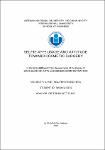| dc.description.abstract | This result aims to determine and evaluating the impact of Selfie App Usage on Appearance Dissatisfaction and through that relationship, the potential effect of Selfie App Usage on Attitude Toward Cosmetic Surgery. Different from the original model, this research replaces the Internalization factor with Selfie factor which has 2 sub factors: Selfie App Usage and Photo Taking/Sharing. The data analysis was conducted on the responses from 306 participants and the data analysis process includes EFA, CFA and SEM. The result of the research shows that while Social Pressure has no significant impact on Selfie, both Selfie and Social Pressure do have significant positive impact on Appearance Dissatisfaction (reversed scale) which is really surprising as on the contrary to many other research, Social Pressure does play a significant role in increasing appearance satisfaction. The impact of Appearance Dissatisfaction (reversed scale) on Attitude Toward Cosmetic Surgery is significant and positive as the statistics shows. This research should provide an insight to marketers when it comes to reaching out and building the customer base for the business. As for the researchers and therapists, this research contributes to the theorical base of information for future researches.
Keyword: selfie, selfie apps, attitude, cosmetic surgery, social pressure, appearance dissatisfaction, photo. | en_US |


